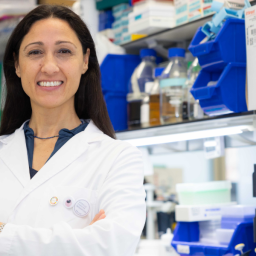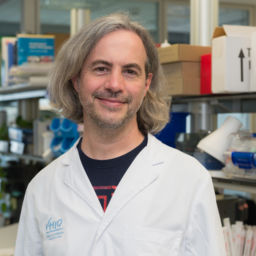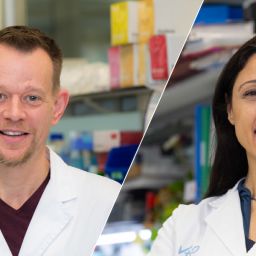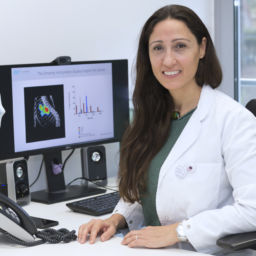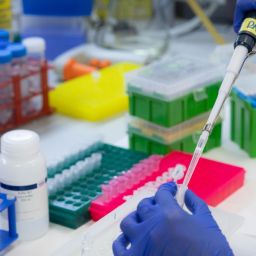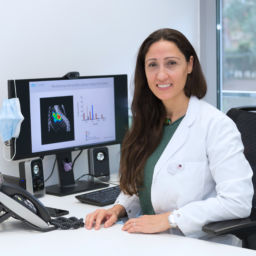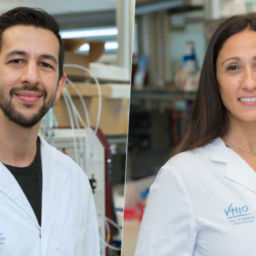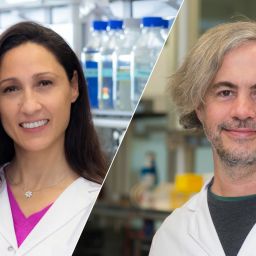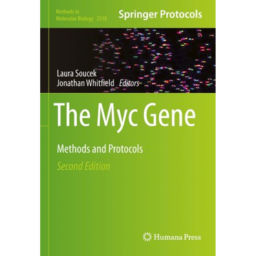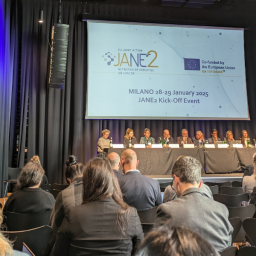
This is the third clinical trial carried out with OMO-103, a drug developed at the Vall d’Hebron Institute of Oncology (VHIO), part of the Vall d’Hebron Campus at Barcelona, through the spin-off Peptomyc, which targets the MYC oncogene, which is deregulated in most tumors but which until recently was considered therapeutically unreachable.
After having demonstrated in a first trial in patients that OMO-103 has a manageable safety profile and promising anti-tumor activity, a phase Ib clinical trial is currently underway in patients with metastatic pancreatic cancer and a third trial has just begun in patients with advanced osteosarcoma.
The trial is funded by the Osteosarcoma Institute and aims to evaluate the clinical activity, safety and pharmacodynamics of OMO-103 in patients with advanced osteosarcoma.
This investigator-initiated phase 2 trial conducted by the Vall d’Hebron Institute of Oncology (VHIO) in Barcelona, Spain, is sponsored by the Osteosarcoma Institute (OSI) whose mission is to dramatically increase treatment options and survival rates in osteosarcoma patients through identifying and funding the most promising and breakthrough osteosarcoma clinical trials and science.
Dr. Lee Helman, Director of the OSI, comments that “MYC overexpression occurs in a subset of patients with osteosarcoma and there is mounting evidence that this may be associated with a poor outcome. We are grateful for the opportunity to support a study evaluating the use of a MYC inhibitor in collaboration with VHIO and Peptomyc.”
The OSI is a science-driven organization whose strategy is guided by its active and engaged Strategic Advisory Board (SAB) of preeminent physicians and other researchers from academia and industry. We would like to acknowledge OSI SAB members William Tap, MD; Katherine Janeway, MD, MMSc; Brian Crompton, MD, Lara Davis, MD, and Chand Khanna, DVM, PhD for their expert contributions to the development of this clinical trial. The trial is also supported in collaboration with Curing Kids Cancer, The Morgan Adams Foundation, and The Kristen Ann Carr Fund.
“We are extremely grateful to the OSI for this study, and we are thrilled to expand our OMO-103 clinical program with the initiation of a third clinical trial for this candidate, underscoring OMO-103’s potential versatility across a broad range of solid tumors,” comments Dr. Laura Soucek, ICREA Professor, Head of the Antitumor Therapies Modelling Group; Director of the Experimental Therapeutics Program at VHIO and CEO of Peptomyc.
“Patients with advanced osteosarcoma, a rare type of bone cancer, have an extremely poor prognosis, highlighting the need for novel treatment regimens to combat this highly aggressive disease. With MYC representing a bad prognostic for osteosarcoma patients – potentially resulting in resistance to standard of care treatment – we believe that inhibiting MYC could have a significant anti-tumor effect in this dismal disease,” says Dr. Claudia Valverde, medical oncologist at the Vall d’Hebron University Hospital, senior researcher of the Genitourinary Tumors, Central Nervous System (CNS), Sarcomas and Cancer of Unknown Primary Location Group at VHIO and principal investigator of the trial who adds: “Although there are therapeutic options for the primary tumor, between 30% and 50% of patients with osteosarcoma without metastasis at the time of diagnosis develop local or metastatic recurrence, so it is necessary to find new strategies for patients with advanced or metastatic osteosarcoma. Hence the importance of this pioneering study in which a MYC inhibitor is tested for the first time in patients with advanced osteosarcoma.”
The OSTEOMYC trial aims to evaluate the clinical activity and safety, pharmacodynamics and pharmacokinetics of OMO-103 in advanced osteosarcoma.
The trial is aimed at adult patients with advanced osteosarcoma, although patients between 12 and 18 years of age (adolescents and young adults) who would be treated in the Vall d’Hebron Campus could potentially participate. This would be the first pediatric indication for OMO-103, promoted by the Osteosarcoma Institute in their disease outcome.
More information about the trial is available at: https://clinicaltrials.gov/study/NCT06650514
About Osteosarcoma
Osteosarcoma, while rare, is the most common type of bone cancer and is often associated with a high degree of malignancy, early metastasis, rapid progression, and poor prognosis. This cancer occurs primarily in children, adolescents, and young adults ranging from 10 to 30 years of age. The risk of diagnosis decreases in adulthood but rises again in older adults, usually over the age of 60. Approximately 3 new cases/million population are diagnosed each year. Treatment typically includes surgery and chemotherapy, with chemotherapy administered before and after surgery to help lower the risk of relapse. Even though curative therapy is available for the primary tumor, long-term outcomes for osteosarcoma patients continue to be impacted by metastatic progression and few improvements have been achieved in the last 40 years.
About MYC
MYC is the most dysregulated oncogene in human cancer, controlling multiple transcriptional programs associated to most hallmarks of cancers, including increased proliferation, metastatic potential, immune suppression, and resistance to treatment.
About OMO-103
OMO-103 is a first-in-class and best-in-class mini-protein against MYC. It has successfully been tested in a Phase Ia study in all-comers solid tumors and is currently in a Phase Ib study in metastatic pancreatic ductal adenocarcinoma (mPDAC) patients in combination with standard of care chemotherapy.
About Peptomyc
Peptomyc (www.peptomyc.com) is a spin-off from VHIO – the Vall d’Hebron Institute of Oncology – and ICREA – the Catalan Institute of Research and Advanced Studies, founded in December 2014 in Barcelona, Spain. The company is focused on the development of innovative cell penetrating mini-proteins targeting the MYC oncoprotein for cancer treatment and based on Dr. Soucek’s scientific research in Omomyc (the best direct MYC inhibitor known to date). It is the first company to have successfully completed a Phase 1 clinical trial with a direct MYC inhibitor

